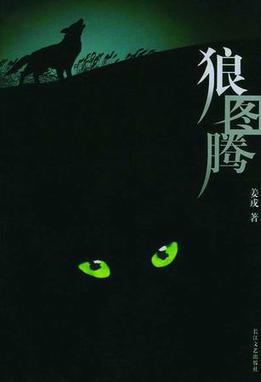Wolf Totem

Wolf Totem (simplified Chinese: 狼图腾; traditional Chinese: 狼圖騰; pinyin: Láng Túténg is a 2004 Chinese semi-autobiographical novel about the experiences of a young student from Beijing who finds himself sent to the countryside of Inner Mongolia in 1967, at the height of China’s Cultural Revolution.[1] The author, Lü Jiamin, wrote the book under the pseudonym Jiang Rong; his true identity did not become publicly known until several years after the book’s publication.[2]
Wolf Totem is narrated by the main character, Chen Zhen, a Chinese man in his late twenties who, like the author, left his home in Beijing, China to work in Inner Mongolia during the Cultural Revolution.[3] Through descriptions of folk traditions, rituals, and life on the steppe, Wolf Totem compares the culture of the ethnic Mongolian nomads and the Han Chinese farmers in the area. According to some interpretations, the book praises the “freedom, independence, respect, unyielding before hardship, teamwork and competition” of the former and criticizes the “Confucian-inspired culture” of the latter, which was “sheep-like”.[1] The book condemns the agricultural collectivisation imposed on the nomads by the settlers, and the ecological disasters it caused, and ends with a 60-page “call to action” disconnected from the main thread of the novel.[4]
The author has said he was inspired to begin writing Wolf Totem by accident: he ignored the advice of the clan chief of the group of nomads with whom he was staying, and accidentally stumbled across a pack of wolves. Terrified, he watched as the wolves chased a herd of sheep off a cliff, then dragged their corpses into a cave. From then on, fascinated by the wolves, he began to study them and their relationship with the nomads more closely, and even attempted to domesticate one.[4]
Wolf Totem exhibited strong sales almost immediately after its release, selling 50,000 copies in two weeks; pirated editions began to appear five days after the book first appeared on shelves.[5] By March 2006, it had sold over four million copies in China, and had been broadcast in audiobook format in twelve parts during prime time on China Radio International.[4] Jiang released a children’s edition of the book in July 2005, cut down to roughly one-third the length.[4][6][7]
Despite the author’s refusal to participate in marketing the book, deals for adaptations of the novel into other media and translations into other languages have set financial records.[8] Penguin Books paid US$100,000 for the worldwide English rights, setting a record for the highest amount paid for the translation rights to a Chinese book; an unspecified Tokyo publisher paid US$300,000 for the rights to publish a manga adaptation, and Bertelsmann bought the German-language rights for €20,000.[4] The author has said that he believes that “in the West they may understand [my book] more fully” than in China.[6]
Other writers took advantage of the author’s anonymity to write fake sequels to Wolf Totem, including two books titled Wolf Totem 2, as well as Great Wolf of the Plains,[9] all with the imprint of the Changjiang Arts Publishing House. As a result, in April 2007, the author issued a statement that denounced all such “sequels” as fraudulent; he indicated that he was doing research for another book, but would not be publishing anything new in the short term.[10]
